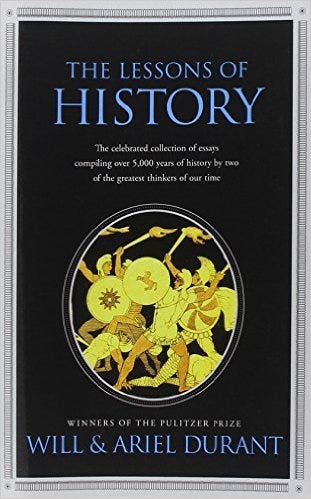This book shows how civilizations evolve and how they shape us

History is a great teacher. The accumulated knowledge about what happened to humanity thus far not only enriches our understanding of the past, it also allows us to understand the present and shape the future.
As technology advances, geographic influences diminish
Trade routes can be thought of as the arteries of civilizations. Historically, civilizations have always flourished close to rivers, oases, oceans, and lakes because they provided not only water and food but a way of transportation and thus trade.
With the advent of modern technology, the geographic importance has lost some importance. Countries have now the possibility to trade goods via trucks, trains, and airplanes. Making it possible for trade to flourish inside big landmasses.
Advancement of civilization is a product of circumstances
Contrary to the racial theory, the advancement of civilization has nothing to do with race. Joseph Gobineau, the father of modern racial thinking, based his theory on examples where the Aryan race supposedly succeeded because of their superiority. He reasoned that whenever they mixed with other races, that superiority decayed.
But there are many counterexamples which disprove racial thinking. Ancient China was at some point the most advanced civilization way before European civilizations such as Egypt and Rome rose. And many civilizations existed in South America such as the Mayans and Incas.
Competition and unequalness
Natural selection works through survival of the fittest, the competition of nature. Through history, our ancestors were subject to this type of competition, often resulting in wars and violence. The proclivity to compete is therefore embedded in our genes.
Inequality is inherent to life too. We have power over certain things but cannot choose other factors like genetic strengths and weaknesses.
Societies with its laws and rules play an important role to maintain a certain equality. The looser the rules are, the faster inequality seems to form. An example of this phenomenon happened in the nineteenth century when the US and England adopted a laissez-faire policy of economics, which means as little government intervention in the economy as possible. Social inequality rose dramatically during that period.
War is the norm through history
Only about 10% of humanities history has been free of wars, why is this? Societies dampen the need for violence among competing individuals, but societies still compete with each other. Coalitions between countries only tend to form when there is a common enemy. So for world peace to form, perhaps there will be a need for an external danger.
People are shaped by culture. Culture is created by trial and error.
Human nature hasn’t changed so much. Our genes are pretty much the same than thousands of years ago. If we were to bring a baby from ancient Sparta and raise it in Germany, the baby would become a normal German citizen. So human evolution is in big part social, not biological.
But if civilizations shape humans, what has shaped civilizations? Innovation in civilizations occurs from individual contributions, often through trial and error. Some ideas stick, and others don’t. Some contributions are put to the test but don’t always persist, like the ideas of Marx, Lenin, and Napoleon.
Ethics are a result of circumstances
Ethics play an important role in each stage of human evolution. In hunter-gatherer times aggressive behavior was helpful for survival. Males were subject to higher death rates because they had to hunt, and therefore had to reproduce with several women.
Once the agricultural age came, cooperation and peace had higher value so that family and thus bigamy became the norm, as children represented an asset.
In the industrial revolution once again a change in morals happened. The high demand for specialization made having children less important and increased the cost of raising children.
Ethics go hand in hand with necessity, and within a century morals are likely to be radically different than from today.
Wealth redistribution can happen when there is too much inequality
Democracies and other systems leave a great degree of freedom for wealth accumulation to happen. When inequality between the poor and the wealthy is too extreme however, there can be a redistribution of wealth. A redistribution of wealth can happen peacefully by taxation, reduction of debt and devaluation of currency or through revolt, often resulting in civil war. Historically
Social systems often work best in combination
Socialism has historically always failed unless it was coupled with other systems or with outside fear. The Russian Revolution of 1917, for instance, worked so well because the country had to defend itself from outside enemies, a decade of relative peace made the USSR fall.
Capitalism has had more success, but even in capitalism, there is the fear of socialism, i.e. revolt of the poor, which is why there is a tendency for capitalist thinkers to increase equality. Socialist thinkers, in a similar way, often strive to broaden freedom in fear of capitalism.
Democracy relies on education
Democracy has shown itself to be the best political system so far. It gives enough flexibility so that successful people thrive as well as science in general.
But democracy relies on educated people. People have to know whom to vote and to resist any attempt to undermine the democratic system.
Human evolution persists the decay of civilizations
Despite the rise and fall of many civilizations, often their contributions live on. Our modern civilization is based on knowledge resulting from thousands of years of human innovation. Those innovations are writing systems, agriculture, mathematics, social systems, etc.
So even if history often repeats itself — unless all knowledge is destroyed — human knowledge and technology will continue to rise.
Click here to get the book NOW
